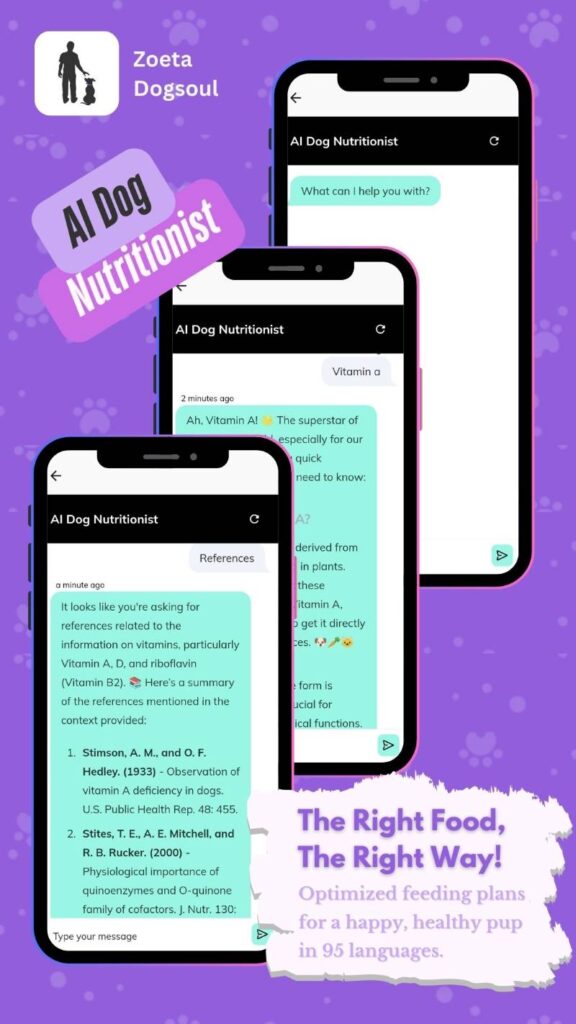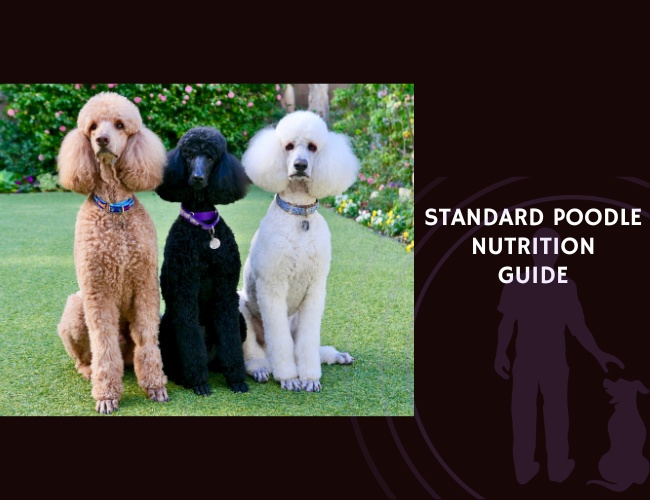Have you ever watched your Standard Poodle gracefully move across the room and wondered what fuels that athletic elegance? These remarkable dogs, with their distinctive coats and intelligent eyes, require more than just any dog food to maintain their vitality. Let us guide you through the fascinating world of Standard Poodle nutrition, where science meets the art of caring for your sophisticated companion.
From their origins as water retrievers in Germany to their current status as beloved family members, Standard Poodles have evolved alongside humans, developing unique nutritional needs that reflect both their working heritage and modern lifestyle. Understanding these needs isn’t just about filling a food bowl—it’s about nurturing a trusting relationship with your furry friend through thoughtful, breed-specific nutrition. 🐾
Understanding Your Standard Poodle’s Unique Metabolism
Your Standard Poodle’s metabolism is like a finely tuned engine, operating at a moderate to high rate that demands quality fuel. Unlike their smaller Toy and Miniature cousins, Standard Poodles possess a metabolic system that reflects their larger frame and athletic capabilities. This means your elegant companion processes nutrients differently than many other breeds, requiring careful attention to both quantity and quality of food.
The Science Behind Their Energy Needs
Standard Poodles typically exhibit what veterinary nutritionists call a “moderate to high metabolic rate.” This translates to specific basal energy requirements (BER) that fluctuate based on several factors:
- Age and life stage development
- Daily activity levels and exercise intensity
- Current body condition score (BCS)
- Environmental temperature variations
- Individual genetic factors
You might notice your Poodle’s energy needs change with the seasons—requiring more calories during cold winter months or after particularly active days at the dog park. This adaptability showcases their remarkable metabolic flexibility, but it also means you’ll need to stay attuned to their changing needs.
Digestive Efficiency: A Delicate Balance
The Standard Poodle’s digestive system generally functions with impressive efficiency, processing nutrients effectively when provided with appropriate nutrition. However, this efficiency comes with a sensitivity that many Poodle parents discover through experience. Their moderate stomach size and refined digestive tract mean that meal timing and portion control become crucial elements of their care.
Did you know that your Poodle’s digestive efficiency can actually work against them if not properly managed? Their ability to extract nutrients so effectively means they can be prone to weight gain if portions aren’t carefully monitored. This efficiency, combined with their intelligent nature (which often leads to successful begging behaviors), creates a perfect storm for potential obesity if we’re not vigilant.
Macronutrient Magic: Building Blocks for Poodle Health
When it comes to feeding your Standard Poodle, understanding macronutrients—proteins, fats, and carbohydrates—is like learning the language of canine nutrition. Each plays a vital role in maintaining your dog’s lustrous coat, supporting their active lifestyle, and ensuring their trademark intelligence stays sharp.
Protein: The Foundation of Poodle Power
Your Standard Poodle’s protein requirements shift throughout their life like chapters in a book, each stage telling its own nutritional story:
For growing puppies (up to 12-18 months), protein needs soar to 22-26% of their diet. This higher percentage supports:
- Rapid muscle development
- Proper organ formation
- Immune system establishment
- Cognitive development
Adult Standard Poodles (1-7 years) thrive on 18-22% protein, maintaining:
- Lean muscle mass
- Coat health and texture
- Energy levels for daily activities
- Overall metabolic function
Senior Poodles (7+ years) often benefit from slightly elevated protein levels (20-24%), which helps:
- Preserve muscle mass against age-related loss
- Support immune function
- Maintain cognitive health
- Aid in recovery from illness or injury
Quality Over Quantity: Choosing Protein Sources
Not all proteins are created equal in your Poodle’s bowl. High-quality, easily digestible protein sources make all the difference. Look for named meat sources like:
- Fresh chicken, turkey, or duck
- Wild-caught fish (salmon, herring, whitefish)
- Grass-fed lamb or beef
- Novel proteins for sensitive dogs (venison, rabbit, kangaroo)
The key is bioavailability—how well your Poodle’s body can actually use the protein provided. A lower percentage of high-quality protein often surpasses a higher percentage of poor-quality protein meals or by-products.
Fats: More Than Just Energy
When you run your fingers through your Poodle’s distinctive coat, you’re feeling the direct result of proper fat nutrition. Fats provide 15-20% of your Standard Poodle’s diet, serving multiple crucial functions:
Essential fatty acids, particularly omega-3 and omega-6, create that enviable Poodle coat shine while supporting:
- Brain function and cognitive health
- Joint flexibility and comfort
- Skin barrier function
- Inflammatory response regulation
- Cellular health throughout the body
The ideal omega fatty acid ratio leans toward higher omega-3s, which you can achieve through:
- Fish oil supplementation
- Flaxseed or chia seed additions
- Marine-based protein sources
- Algae-derived supplements for vegetarian options
Carbohydrates: The Controversial Component
Here’s where Standard Poodle nutrition gets interesting. While dogs don’t have a specific requirement for carbohydrates, properly selected carbs can provide valuable benefits for your Poodle:
Highly digestible carbohydrate sources offer:
- Steady energy release
- Dietary fiber for digestive health
- Prebiotics for gut microbiome support
- Satiety between meals
Choose minimally processed options like:
- Sweet potatoes or pumpkin
- Brown rice or quinoa
- Oats or barley
- Legumes (in moderation)
Some Standard Poodles exhibit carbohydrate sensitivities, manifesting as:
- Excessive gas or bloating
- Loose stools or digestive upset
- Skin irritation or ear infections
- Weight gain despite controlled portions
If you notice these signs, working with your veterinarian to identify problem ingredients becomes essential.
The Micronutrient Symphony: Small Players, Big Impact
While macronutrients might be the headliners, micronutrients play the supporting roles that make the entire nutritional performance possible. Your Standard Poodle’s need for vitamins and minerals creates a complex symphony of nutritional requirements.
Vital Vitamins for Vibrant Poodles
Each vitamin serves specific functions in your Poodle’s body:
Vitamin A supports:
- Night vision and overall eye health
- Immune system function
- Skin cell turnover
- Reproductive health
Vitamin D enables:
- Calcium absorption for strong bones
- Muscle function and strength
- Immune system regulation
- Mood and behavior balance
Vitamin E provides:
- Antioxidant protection
- Skin and coat health
- Immune support
- Reproductive function
B-Complex Vitamins facilitate:
- Energy metabolism
- Nervous system function
- Red blood cell formation
- Stress response management
Mineral Must-Haves
The mineral requirements for Standard Poodles create a delicate balance:
Calcium and Phosphorus: These minerals work in partnership, requiring precise ratios (ideally 1.2:1 to 1.5:1) for:
- Proper bone development in puppies
- Skeletal maintenance in adults
- Muscle contraction and nerve function
- Blood clotting processes
Zinc supports:
- Immune function optimization
- Wound healing
- Skin and coat health
- Proper growth and development
Selenium offers:
- Antioxidant enzyme function
- Thyroid hormone metabolism
- Immune system support
- Cancer prevention properties
Iron enables:
- Oxygen transport via red blood cells
- Energy production
- Immune function
- Cognitive development

Navigating Food Sensitivities: When Your Poodle’s Tummy Talks
Standard Poodles, with their refined constitutions, often develop food sensitivities that can puzzle even experienced dog parents. Understanding these sensitivities helps you become a detective in your own kitchen, solving the mystery of what makes your Poodle thrive versus merely survive.
Common Culprits in the Poodle Diet
The most frequent offenders include:
Protein sensitivities:
- Beef (most common allergen)
- Chicken and poultry products
- Dairy products
- Eggs
- Fish (less common but possible)
Grain and carbohydrate reactions:
- Wheat and wheat gluten
- Corn and corn products
- Soy
- White potatoes (in some cases)
Recognizing the Signs
Your Poodle might be telling you about food sensitivities through:
Skin manifestations:
- Persistent itching, especially paws and ears
- Red, inflamed skin patches
- Hot spots that won’t heal
- Recurring ear infections
- Dull, flaky coat despite good grooming
Digestive signals:
- Chronic loose stools or diarrhea
- Excessive gas or bloating
- Vomiting after meals
- Reluctance to eat
- Weight loss despite adequate intake
Behavioral changes:
- Lethargy or decreased activity
- Irritability or mood changes
- Excessive licking or chewing
- Restlessness after eating
The Elimination Diet Journey
If you suspect food sensitivities, an elimination diet becomes your roadmap to discovery:
- Start with a novel protein and carbohydrate your dog has never eaten
- Feed only these ingredients for 8-12 weeks
- Monitor all symptoms carefully
- Gradually reintroduce suspected allergens one at a time
- Document reactions to identify triggers
This process requires patience and dedication, but the reward—a comfortable, thriving Poodle—makes every effort worthwhile. 🧡
Life Stage Nutrition: Feeding Through the Years
Your Standard Poodle’s nutritional journey mirrors their life story, with each chapter requiring its own specialized approach to feeding. Understanding these transitions helps you provide optimal nutrition from playful puppyhood through dignified senior years.
Puppyhood: Building the Foundation (0-18 months)
Those adorable Poodle puppies bouncing around your home require nutrition that matches their explosive growth. During this critical period, their bodies are:
- Developing skeletal structure at remarkable rates
- Building muscle mass and coordination
- Establishing immune system foundations
- Creating neural pathways for learning
Feeding strategies for puppies:
- Multiple small meals (3-4 times daily) to support steady growth
- High-calorie formulations (350-450 kcal per cup)
- Controlled calcium levels to prevent developmental orthopedic diseases
- DHA supplementation for cognitive development
- Gradual transition to adult food around 12-15 months
The temptation to accelerate growth through overfeeding must be resisted. Slower, steady growth produces healthier adult dogs with fewer orthopedic issues—patience during puppyhood pays dividends in adult health.
Adult Maintenance: The Prime Years (1-7 years)
Your adult Standard Poodle represents the breed at its finest—active, intelligent, and requiring balanced nutrition to maintain this peak condition. During these years, focus shifts from growth to maintenance:
Key nutritional goals:
- Maintaining ideal body condition score (4-5 out of 9)
- Supporting daily activity levels
- Preserving coat quality and skin health
- Preventing obesity through portion control
Feeding considerations:
- Twice-daily feeding works well for most adults
- Adjust portions based on activity level
- Monitor weight monthly
- Consider seasonal adjustments
- Maintain consistent feeding times
Senior Sustenance: Golden Years Grace (7+ years)
As your Standard Poodle enters their senior years, nutritional needs shift once again. You might notice:
- Decreased activity levels
- Changes in metabolism
- Dental considerations
- Potential health challenges
Senior-specific nutritional support:
- Slightly increased protein to combat muscle loss
- Reduced calories if activity decreases
- Joint support supplements (glucosamine, chondroitin)
- Antioxidant enrichment for cognitive health
- Omega-3 fatty acids for anti-inflammatory benefits
- Smaller, more frequent meals if needed
- Softer food textures for dental comfort
Special Circumstances: Reproduction and Recovery
Breeding females and recovering dogs require specialized nutrition:
During pregnancy:
- Gradual calorie increase (25-50% by whelping)
- Higher protein requirements
- Calcium supplementation only under veterinary guidance
- Multiple small meals to accommodate reduced stomach capacity
During lactation:
- Peak nutritional demands (2-4 times normal intake)
- Free-choice feeding often necessary
- High-quality puppy food may be appropriate
- Abundant fresh water availability
- Gradual weaning transition
Post-surgery or illness recovery:
- Easily digestible formulations
- Increased protein for tissue repair
- Possible appetite stimulants
- Modified feeding schedules
- Close veterinary monitoring
Graceful. Intelligent. Fuelled.
Your Standard Poodle deserves more than generic nutrition.
Behind every elegant stride and perceptive gaze lies a body engineered for performance and sensitivity. Their balanced metabolism requires tailored feeding—not just calories, but chemistry designed to sustain brilliance.
Protein powers elegance and intellect alike.
From muscle tone to mental agility, your Poodle’s needs shift with each life stage. Quality matters more than quantity—named meat sources, bioavailable proteins, and precise balance ensure they thrive, not just survive.



Fats nourish the beauty you can see—and the health you can’t.
Their lustrous coat, supple joints, and cognitive clarity depend on essential fatty acids. It’s not about richness—it’s about refinement. Feed the foundation of their grace with mindful fat profiles and omega-rich precision.
Breed-Specific Health Risks: Nutritional Prevention Strategies
Standard Poodles, despite their overall hardiness, face certain breed-specific health challenges where nutrition plays a crucial preventive or management role. Understanding these risks empowers you to make informed feeding decisions that could significantly impact your Poodle’s long-term health.
Hip Dysplasia: A Weighty Matter
This hereditary condition affects many Standard Poodles, but nutritional management can significantly influence its progression:
Nutritional prevention strategies:
- Maintain lean body condition throughout life
- Avoid rapid growth in puppies through controlled feeding
- Ensure proper calcium:phosphorus ratios (1.2:1 to 1.5:1)
- Consider joint-supporting supplements early
- Choose foods with natural anti-inflammatory ingredients
Every extra pound your Poodle carries multiplies the stress on their hips. Think of weight management not as restriction but as joint preservation—you’re literally adding comfortable years to their life.
Bloat (Gastric Dilatation-Volvulus): The Silent Emergency
This life-threatening condition particularly affects deep-chested breeds like Standard Poodles. While genetics play a role, feeding practices significantly influence risk:
Preventive feeding strategies:
- Divide daily food into 2-3 smaller meals
- Avoid exercise 1 hour before and after meals
- Use elevated feeders with caution (controversial)
- Prevent rapid eating with slow-feeder bowls
- Limit water intake immediately after meals
- Avoid foods that cause excessive gas
- Consider prophylactic gastropexy in high-risk dogs
High-risk feeding behaviors to avoid:
- Single large meals
- Gulping food quickly
- Eating from ground level (debated)
- Stress during feeding times
- Sudden diet changes
- Foods high in fat or citric acid
Pancreatitis: When Fat Becomes Foe
Standard Poodles can develop pancreatitis, where dietary fat management becomes crucial:
Management through nutrition:
- Maintain moderate fat levels (10-15% for at-risk dogs)
- Avoid table scraps and fatty treats
- Choose easily digestible proteins
- Consider prescription low-fat diets if needed
- Monitor for signs: vomiting, abdominal pain, lethargy
- Implement gradual diet transitions
Dilated Cardiomyopathy (DCM): The Taurine Connection
Recent research has highlighted potential links between diet and DCM in dogs, making this a concern for Standard Poodle parents:
Nutritional considerations:
- Ensure adequate taurine intake
- Be cautious with grain-free diets
- Consider taurine supplementation
- Choose foods with named meat sources
- Regular cardiac screening for at-risk dogs
- Work with veterinary nutritionists for concerns
Addison’s Disease: Electrolyte Excellence
Standard Poodles have increased risk for this adrenal condition, where electrolyte balance becomes critical:
Dietary support includes:
- Consistent sodium levels
- Balanced mineral content
- Stress reduction during feeding
- Regular meal schedules
- Possible prescription diets
- Close monitoring during episodes
Choosing the Right Diet Type: Options for Every Poodle
The modern pet food landscape offers overwhelming choices, but understanding each option helps you select the perfect match for your Standard Poodle’s needs, your lifestyle, and your philosophy on pet nutrition.
Commercial Kibble: Convenience Meets Nutrition
High-quality commercial kibble remains the most popular choice for good reasons:
Advantages:
- Complete and balanced nutrition
- Convenient storage and feeding
- Consistent quality and formulation
- Dental benefits from crunching
- Cost-effective for most budgets
- Extensive research backing
Selection criteria for Standard Poodles:
- Named meat as first ingredient
- Appropriate protein levels for life stage
- Limited fillers and by-products
- No artificial colors or preservatives
- AAFCO certification
- Breed or size-specific formulations
Top considerations:
- Large breed formulations for puppies
- Kibble size appropriate for Poodle mouths
- Storage in airtight containers
- Check expiration dates
- Gradual transitions between brands
Home-Cooked Diets: Love in Every Bowl
Some Poodle parents prefer preparing meals themselves:
Benefits of home cooking:
- Complete ingredient control
- Customization for sensitivities
- Bonding through meal preparation
- Fresh, whole food nutrition
- No preservatives or additives
Challenges to consider:
- Achieving nutritional balance
- Time-intensive preparation
- Cost can exceed commercial foods
- Storage limitations
- Travel complications
- Risk of nutritional deficiencies
Essential guidelines:
- Work with veterinary nutritionist
- Use balanced recipes only
- Include variety over time
- Supplement as directed
- Regular blood work monitoring
- Avoid toxic ingredients
Raw Feeding: Back to Nature?
The raw food movement has passionate advocates and critics:
Potential benefits:
- Improved coat condition
- Smaller, firmer stools
- Increased energy levels
- Better dental health
- Reduced allergies in some dogs
- High palatability
Important considerations:
- Bacterial contamination risks
- Nutritional balance challenges
- Higher cost than kibble
- Freezer space requirements
- Not suitable for immunocompromised homes
- Veterinary opinion varies
Safe raw feeding practices:
- Source from reputable suppliers
- Follow strict hygiene protocols
- Balance over time, not daily
- Include organ meats and bones
- Consider commercial raw options
- Monitor for nutritional deficiencies
Hybrid Approaches: Best of Both Worlds
Many successful Poodle parents combine approaches:
- Kibble base with fresh toppers
- Rotating between kibble and raw
- Home-cooked meals several times weekly
- Commercial fresh-frozen options
- Dehydrated or freeze-dried foods
- Prescription diets when needed

Practical Feeding Guidelines: Making Mealtime Magic
Transforming nutritional knowledge into daily practice requires understanding not just what to feed but how to create positive feeding experiences for your Standard Poodle.
Establishing Feeding Routines
Consistency creates security in your Poodle’s world:
Optimal scheduling includes:
- Same times daily (within 30-minute window)
- Quiet, designated feeding area
- Consistent pre-meal routine
- 15-20 minutes for meal consumption
- Remove uneaten food
- Fresh water always available
Addressing Common Feeding Challenges
The Fast Eater
If your Poodle inhales their food:
- Use puzzle feeders or slow-feed bowls
- Scatter feeding on clean surfaces
- Frozen Kong toys with meals
- Multiple small portions
- Food-dispensing toys
- Consider underlying anxiety
The Picky Eater
When your Poodle becomes selective:
- Rule out medical issues first
- Avoid frequent diet changes
- Limit treats to 10% of calories
- Try warming food slightly
- Add low-sodium broth
- Maintain regular meal times
- Don’t leave food out all day
Food Guarding Behaviors
Address resource guarding early:
- Trade training with high-value treats
- Hand-feeding exercises
- Multiple food stations if needed
- Positive reinforcement only
- Professional trainer consultation
- Never punish guarding behavior
Transitioning Foods Successfully
Whether changing life stages or addressing sensitivities:
Week 1: 75% old food, 25% new food Week 2: 50% old food, 50% new food Week 3: 25% old food, 75% new food Week 4: 100% new food
Monitor for digestive upset and slow transition if needed. Some sensitive Poodles require even more gradual changes over 4-6 weeks.
Treat Philosophy: Rewards Without Risks
Treats strengthen bonds but require moderation:
Healthy treat options:
- Single-ingredient proteins
- Frozen vegetables (carrots, green beans)
- Small training treats
- Homemade options
- Dental chews (supervised)
Treat guidelines:
- Maximum 10% of daily calories
- Adjust meal portions accordingly
- Use during training sessions
- Avoid human food treats
- Check ingredients carefully
Monitoring and Adjusting: Your Poodle’s Nutritional Journey
Successful Standard Poodle nutrition requires ongoing observation and adjustment. Your dog’s needs evolve with age, season, activity level, and health status.
Body Condition Scoring: Your Monthly Check-In
Learn to assess your Poodle’s body condition:
Ideal condition (BCS 4-5/9) shows:
- Ribs easily felt but not visible
- Visible waist from above
- Abdominal tuck from side
- Smooth coat over muscle
- Energy and enthusiasm
Signs requiring dietary adjustment:
- Ribs difficult to feel (reduce calories)
- Prominent ribs/spine (increase calories)
- Loss of waist definition
- Decreased activity levels
- Coat quality changes
Creating a Nutrition Journal
Track your Poodle’s nutritional journey:
- Weekly weight recordings
- Food brand and amount
- Treat inventory
- Activity level notes
- Any digestive issues
- Behavioral changes
- Supplement schedule
- Veterinary findings
This information becomes invaluable for veterinary consultations and identifying patterns.
Seasonal Adjustments
Your Poodle’s needs fluctuate with seasons:
Winter considerations:
- Increased calories for temperature regulation
- Possible vitamin D supplementation
- Hydration encouragement
- Joint support for cold weather
Summer modifications:
- Decreased calories if less active
- Increased water availability
- Lighter meals during heat
- Frozen treats for cooling
Working with Your Veterinary Team
Partnership with professionals ensures optimal nutrition:
Annual consultations should include:
- Body condition assessment
- Dietary history review
- Blood work interpretation
- Supplement recommendations
- Age-appropriate adjustments
- Breed-specific concerns
When to seek immediate consultation:
- Sudden weight changes
- Persistent digestive issues
- Decreased appetite
- Excessive thirst
- Behavioral changes around food
- Suspected allergic reactions
The Science Behind the Bowl: Understanding Current Research
While dedicated Standard Poodle nutritional studies remain limited, broader canine nutrition research provides valuable insights applicable to our elegant companions.
Metabolic Insights
Recent research reveals:
- Individual metabolic rates vary up to 20% between similar dogs
- Spay/neuter status affects metabolism significantly
- Gut microbiome influences nutrient absorption
- Genetic factors impact nutrient requirements
- Environmental stressors alter nutritional needs
Emerging Nutritional Strategies
Current investigations explore:
- Personalized nutrition based on DNA testing
- Microbiome support through prebiotics/probiotics
- Functional foods for specific health conditions
- Novel protein sources for allergies
- Time-restricted feeding benefits
- Anti-aging nutritional protocols
The Future of Poodle Nutrition
Advancing science promises:
- Breed-specific nutritional guidelines
- Biomarker-based diet customization
- Preventive nutrition protocols
- Enhanced supplement efficacy
- Sustainable protein alternatives
- Precision feeding technologies
Conclusion: Nourishing the Poodle-Human Bond
As we reach the end of our nutritional journey together, you now possess the knowledge to make informed decisions about your Standard Poodle’s diet. From understanding their unique metabolism to navigating life stage transitions, from preventing breed-specific health issues to choosing the right diet type—you’re equipped to provide nutrition that supports not just survival, but vibrant, joyful living.
Remember, optimal nutrition for your Standard Poodle isn’t about perfection—it’s about informed choices, careful observation, and responsive adjustments. Every Poodle is unique, and what works brilliantly for one may need modification for another. Trust your instincts, work with your veterinary team, and most importantly, enjoy the process of nourishing your remarkable companion.
Your Standard Poodle relies on you to translate the science of nutrition into daily acts of care. Each meal you provide, each treat you offer, each adjustment you make based on their changing needs—these are expressions of the profound bond you share. In return, they offer loyalty, intelligence, and that distinctive Poodle joie de vivre that enriches our lives immeasurably.
Is the Standard Poodle diet right for your lifestyle? Can you commit to the ongoing attention their nutritional needs require? If you’ve read this far, the answer is likely yes. Your dedication to understanding their needs speaks volumes about the care you’re prepared to provide. Welcome to the rewarding world of Standard Poodle nutrition—your elegant companion is lucky to have you as their nutritional advocate. 🐾
Next Steps on Your Nutritional Journey:
- Schedule a nutritional consultation with your veterinarian
- Begin a feeding journal to track your Poodle’s responses
- Join Standard Poodle nutrition forums for peer support
- Consider working with a veterinary nutritionist for customized plans
- Stay informed about emerging research in canine nutrition
Your Standard Poodle’s nutritional story continues to unfold with each meal, each season, each life stage. May it be a story of health, vitality, and the deep satisfaction that comes from providing exceptional care for an exceptional breed.










